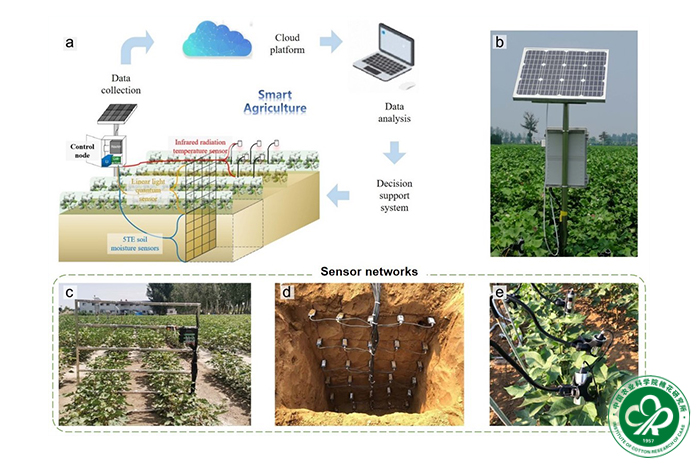- Location : Home» Newsroom
Researcher YabingLi's team from Cotton Research Institute of CAAS revealed the mechanism of optimizing sowing time and precise resource management to adapt cotton production to climate change
Recently, the research team led by Yabing Li from the Cotton Research Institute of the Chinese Academy of Agricultural Sciences conducted a study on the utilization of light, temperature, and water resources of cotton at different sowing dates based on smart agricultural sensor networks. The study revealed the mechanism of promoting cotton production to adapt to climate by optimizing sowing dates and precise management of light, temperature, and water resources under climate change, providing new ideas for cotton climate-smart cultivation and precise management of farmland resources.The relevant research was published in the internationally authoritative academic journal "Industrial Crops and Products" (IF=6.449, Agricultural and Forestry Science, CASZone 1, Top) with the title "Adaptation of cotton production to climate change by sowing date optimization and precision resource management".
Optimizing the sowing date is an important strategy for crop production to adapt to climate change. By adjusting the sowing date, changes can occur in the light, temperature, and water environment of crops at different growth stages. The accumulation of differences in light, temperature, and water environment changes the resource utilization characteristics of crops, thereby affecting their growth process and yield formation. At present, there is a lack of field evidence on the coupling effects of various environmental resources on cotton growth and yield formation, as well as their response to climate change.
This study accurately quantified the utilization characteristics of light, temperature, and water resources of cotton at different sowing dates under extreme rainfall climate conditions in 2021 and normal climate conditions in 2022 using high-resolution light, temperature, and water environment sensors.Researcher found that sowing date management and climate change have significant interactive effects on cotton yield components and utilization efficiency of light, temperature, and water resources.The extreme rainstorm reduced the seed cotton yield by 52.75% at most, and the yield reduction could be alleviated by sowing date management. The accumulation of light, temperature, and water resources, as well as the utilization efficiency of water and heat resources, have a positive coupling effect on the growth of cotton biomass and yield, respectively.Further research has found that under climate change, optimizing sowing dates and accurately managing temperature and light resources during the squaring stage, as well as water resources during the flowering and boll development stage, can effectively increase cotton yield. The research results have important reference value for sustainable cotton production.
The first authors of the paper are Fengqi Wu andSimeng Guo, who jointly cultivate master's degrees with the School of Agriculture sciences of Zhengzhou University, and the corresponding author is researcher YabingLi from the Cotton Research Institute of CAAS. This study has received funding from the National Key R&D Program and the National Natural Science Foundation of China.
